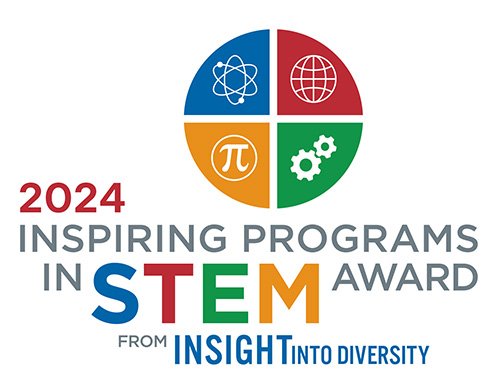Integration of Science, Technology and Engineering

Join us to be a part of an exciting, innovative program and national award-winning program unique in Michigan! In InSciTE, you can explore the science, technology, and engineering challenges you are passionate about to gain transferrable skills. InSciTE is a certificate aimed at empowering you with the 21st-century transferable skills employers are keen to see on resumes.
You can think of this certificate as a 15-credit minor consisting of classes that count towards your Gen Ed requirements. The certificate consists of 5 courses: a 100-level course, a 200-level course, a 300-level course, and two 400-level courses that serve as a capstone.
Each course is offered in the Spring semester, (besides the 400-level courses that are offered as a Fall- Spring sequence to allow students more time for an authentic research experience).
Students are accepted into the program during the Fall of their freshman year and complete the program as a cohort. Transfer students have the opportunity to join the program by being able to “double-up” and take two InSciTE courses simultaneously to complete the program.

Mission
Our mission is to create an equitable student-driven environment for undergraduate students to develop skills on interdisciplinary communication, collaboration and real-world problem solving to become culturally competent and effective leaders.
To achieve our mission, we adhere to the core values of equity, collaboration, relevance to real-world problems, being learner-centered and supporting creative problem solving, defined below:
- Equity, or “Providing students with resources that address educational barriers”: The program is built on a culture of hope and belonging as a pathway to diversity, equity and inclusion for all involved. As such, all aspects of the program are operated with a specific focus on supporting a diverse community of socially responsible members.
- Relevance to real-world problems or “Skills are taught using content that is based on currently relevant challenges that students identify”: Students are empowered to explore their interests by choosing real world challenges through consensus building. Students are engaged in content that is culturally relevant to develop real-world problem-solving skills. All members learn to communicate process and products to varied audiences and in professional settings.
- Learner-centered or “Learners are active agents”: The design of courses is centered on students being actively engaged. Students and instructors become part of a learning partnership to model a culture of life-long learning. The program creates a space where students and instructors have opportunities to take risks, fail, build resilience and contribute.
- Collaboration or “Action of working with others”: students learn as part of diverse teams, both inside and outside the classroom space. Similarly, instructors from various STEM fields work together when both designing and implementing the course. Lastly, students work with instructors to establish the direction of courses and research. The program fosters a culture of respectful communication between all members.
- Creative problem solving or “Challenges are addressed from a multitude of perspectives”: Program addresses problems using multiple approaches and cultivate a culture where the process to gain knowledge, develop a solution and acquire knowledge is valued as much as the deliverable product. Everyone develops their own toolbox to gain career-relevant skills that are individually relevant.
Objectives
- Collaborate successfully: Students develop professional relationships and work together in diverse teams to achieve a common goal.
- Communicate effectively: Students express ideas effectively to both technical and general audiences through oral, written and visual media, and students listen actively to provide and receive constructive criticism
- Employ processes to achieve desired outcomes: Students decompose a problem to explore, design, and implement creative solutions, continuously evaluate progress, navigate uncertainty.
- Develop scientific habits of the mind: Students apply scientific contents from diverse fields in order to appropriately design experiments, gather and manage data, analyze and draw conclusions.
- Develop personal and professional identities: Students reflect upon their experiences to further their sense of self in order to become confident career-ready leaders.
Support InSciTE at CMU
Help support the launch of our innovative program. Be a part of the solution for tomorrow's STEM leaders.